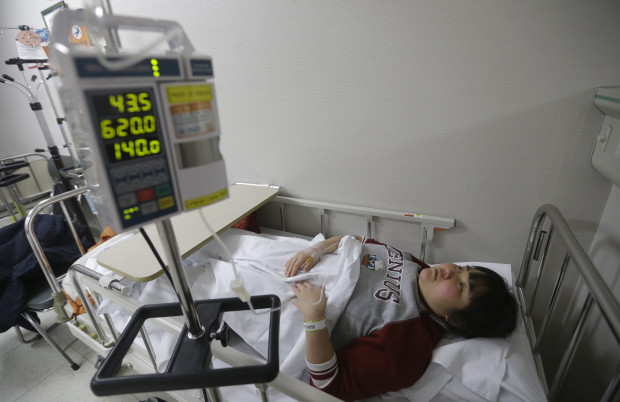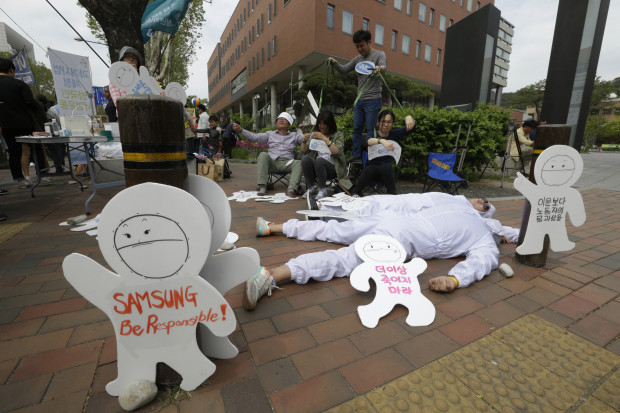Samsung workers sickened by chemicals in factories speak up

In this Jan. 27, 2016 photo, Kim Mi-seon, 36, former Samsung display factory worker who lost sight in 2014 since diagnosed with multiple sclerosis, lies on a hospital bed in Seoul, South Korea. An Associated Press investigation has found South Korean authorities have, at Samsung’s request, repeatedly withheld crucial information about the chemicals that workers were exposed to at its computer chip and liquid crystal display factories. Workers who have fallen ill due to the chemicals have the right to access such data so they can apply for workers’ compensation from the state. Without this information, government officials commonly reject their cases. AP
SEOUL, South Korea — Samsung Electronics, the leader in the global computer chip and smartphone industries, is South Korea’s biggest company, with about 100,000 workers. An Associated Press investigation found South Korean authorities let Samsung withhold from sick workers and their families crucial information about the chemicals they are exposed to at its computer chip and display factories.
A worker-safety group has documented more than 200 cases of serious illnesses including leukemia, lupus, lymphoma and multiple sclerosis among former Samsung semiconductor and LCD workers. Seventy-six have died, most in their 20s and 30s.
It is extremely difficult for workers to get compensation for occupational diseases from the South Korean government, and without details on their exposure to toxins in their workplaces it is almost impossible.

In this May 1, 2016 photo, members of the electronics industry workers advocacy group Banolim perform during a rally against the electronics giant’s response to former employees’ health concerns on a street in Seoul, South Korea. An Associated Press investigation has found South Korean authorities have, at Samsung’s request, repeatedly withheld crucial information about the chemicals that workers were exposed to at its computer chip and liquid crystal display factories. Workers who have fallen ill due to the chemicals have the right to access such data so they can apply for workers’ compensation from the state. Without this information, government officials commonly reject their cases. (AP Photo/Ahn Young-joon)
Here are comments from Samsung workers and their families:
___
Article continues after this advertisementPARK MIN-SOOK, 43, a former Samsung chip worker and breast cancer survivor:
Article continues after this advertisement“In a situation where people’s lives are at stake, (Samsung) brought uninformed kids from the countryside and acted like money is everything, using them as if they were disposable cups.”
___
HWANG SANG-GI, father of Hwang Yu-mi, a former Samsung factory worker who died of leukemia at the age of 22. Hwang launched a movement seeking independent inspections of Samsung factories:
“(Samsung) once offered me 1 billion won ($864,000), asking me to stay silent. The idea was to deny her illness was an occupational disease and to leave me without any power to fight back.”
___
PARK WON-HEE, 42, a former Samsung chip worker diagnosed with lupus who cannot hold a regular job because of her illness. She is a single mother of a teenage daughter:
“My house is subsidized by the government. My child is young. I asked my sisters and they don’t have money. I feel bad for people who cannot get compensation (from Samsung) but we are in an urgent situation. I asked for it to provide a better life for my child.”
___
SONG BOK-JA, 72, mother of former Samsung worker Chung Ji-yeon, who died of leukemia when she was 34:
“What I find most unfair is that some people get compensated and others don’t. My daughter was diagnosed a little over 10 years (after she left Samsung). Up to 10 years, you get compensated, a little after 10 years, you don’t.”
___
KIM MI-SEON, 36, a former Samsung display worker who lost her sight after being diagnosed with multiple sclerosis. Kim lives in a government-subsidized apartment with her sisters.
“There was never any education (at the factory) about what kind of chemicals could be bad so that we could be more careful.”